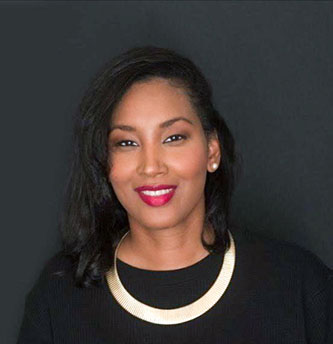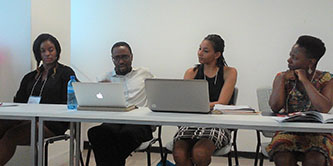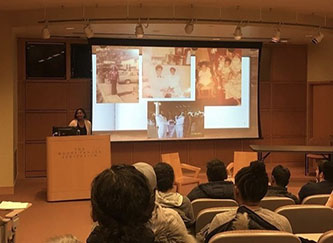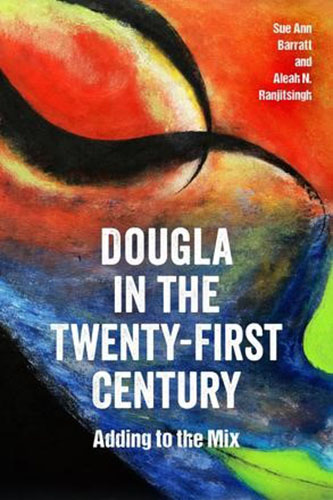Adjunct Faculty Profile: Aleah Ranjitsingh ‘06

Aleah Ranjitsingh '06
The Department of Africana Studies (AFST) is fortunate to have had an extraordinarily talented adjunct teaching Caribbean Studies courses in the department and the Caribbean Studies Program (CAST) since 2015. An accomplished teacher and researcher, not only was Adjunct Assistant Professor Aleah Ranjitsingh a Presidential Scholar while a student at Brooklyn College, but she earned the Part-Time Faculty Award for Excellence in Teaching at Faculty Day in 2019!
Ranjitsingh graduated with her B.A. in political science and English in 2006 and then completed an M.A. in political science the next year. For her BA. in political science, she wrote a thesis, "The Women of the Black Panther Party and How They Contributed to the Women's Liberation Movement," and an honors thesis, “"he Feminist Movement in the Post-Colonial, Anglophone Caribbean: A Look at Trinidad and Tobago." For her M.A., she worked with Professor Mark Ungar on her thesis "MERCOSUR: Potentials for Latin America." She went on to a graduate program focusing on Caribbean and Latin American gender studies and earned her Ph.D. in interdisciplinary gender studies from the Institute for Gender and Development Studies (IGDS), University of the West Indies (UWI), St. Augustine Campus in Trinidad, in 2015. For the doctorate, she completed a dissertation entitled "Women and Change. Hugo Chávez’s Bolivarian Revolution in the Bolivarian Republic of Venezuela."
When asked what she thought about coming back to teach at Brooklyn College after being a student here and then going away for her degree, Ranjitsingh said, "It means a lot to be back at a place that has felt like home for so many years." In terms of her comfortability working here, she laughingly replied, "I walked James Hall as a student, and many of my professors are still here."

Ranjitsingh (third from the left) and Brooklyn College colleagues at the Caribbean Studies Association meeting, 2016.
Ranjitsingh came to the United States from Trinidad right after high school and entered Brooklyn College at age 18. She explained that she "became an adult at Brooklyn College. I feel like I grew up here," and she credits the college for becoming who she is today. "I feel like Brooklyn College put me on a trajectory to become the person that I am and molded me as far as my convictions, my activism, and my research and teaching interests."
But how did this journey start? She was quite emphatic that it was Robert Scott, the now retired Honors Academy liaison, who put her on the path to her successes in academia. She told a story of having come to the college as a first-year student without a clear idea of what to do for her future. But after her first semester, a college adviser told her to go find Scott at the Honors Academy and introduce herself. She recalled how nervous she was to go to the office and knock on the door and ask for him, but she did, and he explained what she needed to do to apply to the Honors Program. She was accepted into the program, was awarded a Presidential Scholarship, and took on the challenges of a rigorous undergraduate education. With the opportunities and training provided by the program, an academic career was now in her view and in her reach. She declared without hesitation that "being sent to Robert Scott changed my life."

Presentation on the concept of Dougla at Brooklyn College, April 2019.
Although Ranjitsingh returned to Brooklyn from her years as a student at UWI and took up college teaching, she had already been teaching for several years. She began teaching as an adjunct at Brooklyn College as soon as she received her M.A., offering the very popular Department of Political Science Core course, People, Power and, Politics. While a dissertator at UWI, she worked with the former IGDS department head on the course Gender and Development With Reference to Caribbean Society, where she also guest lectured. Since returning to Brooklyn College from UWI, she has taught five different courses in the Caribbean Studies Program and Africana Studies as well as the Introduction to Women and Gender Studies course in the Women's and Gender Studies Program. Drawing on her expertise in gender studies, she designed the course The Construction of Gender in Caribbean History and Society for CAST. She has also been teaching at the Borough of Manhattan Community College (BMCC) in the Department of Ethnic and Race Studies, where she has taught multiple sections of the Africana studies course, The Black Man in Contemporary Society. She applies her training in gender studies as she explores Black male experiences from a gendered lens. At BMCC, she has twice been nominated for the Distinguished Teaching Award, in 2019 and 2021.
In addition to teaching, Ranjitsingh has considerable experience in the area of public policy. While still a graduate student she acted as a research consultant for the Caribbean Development Bank, conducting a Country Gender Assessment (CGA) of St Lucia. She drafted regional CGAs for several other Caribbean countries as well, outlining their gender-differentiated trends and emerging gender issues. She also worked as a research consultant for the International Development Research Centre, looking at women's political leadership in Trinidad and Tobago. Since coming back to Brooklyn College, she interned at the United Nations for PeaceWomen, a program of the Women's International League for Peace and Freedom, where she monitored and analyzed outcomes and statements made at the United Nations Commission on the Status of Women and the General Assembly.

Ranjitsingh's co-authored book Dougla in the Twenty-First Century: Adding to the Mix (2021).
With her dissertation research, Ranjitsingh has given much attention to gender issues in the Bolivarian Republic of Venezuela under Hugo Chávez’s 21st-century socialism and the Bolivarian revolution. For example, she presented her research on women's participation in the Bolivarian revolution at the second Global Conference on Femininities and Masculinities in 2012 in Prague while still a graduate student. She published "Women and Change in Hugo Chávez’s Bolivarian Revolution" in the Caribbean Review of Gender Studies in 2016 and "¿El Estado Somos Todos? Women and 21st Century Socialism in the Bolivarian Republic of Venezuela" in Violent and Vulnerable Performances: Challenging the Boundaries of Masculinities and Femininities, a volume she co-edited.
She has also interrogated Caribbean and U.S. political connections in articles such as "Tears Across the Caribbean Sea—A reflection on the mutuality of the Black Lives Matter Movement in the United States and the Caribbean," published in the online journal Medium, and as a panelist in a Women's History Month program entitled "From Eugenia to Kamala—Now What?: The Impact of Caribbean Women in Government; Past, Present and Future."
More recently Ranjitsingh has focused on examining the boundaries and constructions of mixedness. Her research and writing is concerned specifically with the Dougla identity—the offspring of persons of African and Indian descent as seen in spaces such as Trinidad and Tobago, Guyana, and Suriname. She published an article in the Journal of Intercultural Studies special issue on Critical Mixed Race in 2018 with Sue Ann Barratt. Her recent co-authored book with collaborator Barratt, Dougla in the 21st Century: Adding to the Mix (University of Mississippi Press) features a contemporary articulation of the Dougla identity in a comprehensive consideration of this topic.
As a dedicated teacher, researcher, and writer, Ranjitsingh is making her mark at the college and in her field. Once a student at the college, she can relate well to the students who take her classes. "I love engaging with students at Brooklyn College," she said, "especially those who are curious about learning about the African diaspora and the Black experience in Africa, the Caribbean, and the United States."






